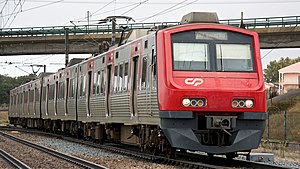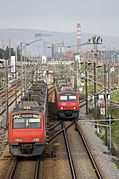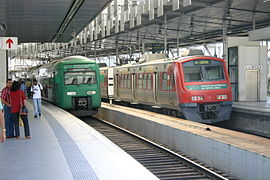CP series 2300
| CP series 2300 | |
|---|---|
|
Railcar 2379 of the type CP-2300 on the Linha do Sado ( Margem Sul do Tejo )
|
|
| Numbering: | 2301-2342, 2351-2392 |
| Number: | 42 (39 in operation) |
| Manufacturer: | Siemens / Sorefame |
| Year of construction (s): | 1991-1995 |
| Gauge : | 1668 mm |
| Length over buffers: | 95,600 mm |
| Top speed: | 120 km / h |
| Installed capacity: | 3100 kW |
| Operating mode: | Electricity (25 kV 50 Hz) |
| Seats: | 316 |
The CP series 2300 ( Portuguese UTE 2300 ) is a 1991-1995 produced series of electrically powered railcars of the Portuguese railway Comboios de Portugal , which is used exclusively in suburban traffic from Lisbon ( CP Urbanos de Lisboa ). The series comprises 42 vehicles. In 1998, twelve railcars of the very similar successor series 2400 followed .
history

In 1991 the Portuguese state railway company Caminhos de Ferro Portugueses (today Comboios de Portugal) ordered 42 railcars from a new series to be produced for the suburb from the German rail vehicle manufacturer Siemens . The plan was to use the new vehicles exclusively for the Linha de Sintra , the heavily used suburban railway line between Lisbon, the Lisbon suburbs (especially Amadora ) and the coastal town of Sintra . The main aim was to be able to decommission old trains from the 2000 , 2050 and 2080 series .
The contract between the CP and Siemens included a value of 440 million German marks, the vehicles should be from 1991 delivered within five years, furthermore the first vehicle 1992. In foresaw the contract that the car bodies and bogies in Portuguese Sorefame built and at least a third of the technical equipment supplied by Siemens should be produced in Portugal. The specifications provided for four-part trains with two motorless intermediate cars.
The first test drives for the new trains built by Siemens / Sorefame took place in 1992, the first vehicle went into operation in the same year.
In 1998 the State Railroad ordered an identical successor series for the 2300 series, the 2400 series. They differ only in the additional air conditioning.
Furnishing
A class 2300 train consists of two motor vehicles with a driver's cab and two non-motorized sidecars. The car bodies are made of stainless steel , the driver's cabs are equipped with fiberglass windows. Based on the predecessor series 2000/2050/2080, this series was also designed with carmine red trim and railcar heads .
The interior of the trains is wide and has plenty of standing room to cope with the mass traffic on the Sintra line, one of the busiest suburban railway lines in Portugal. Each car has three 1,300 mm wide doors on each side.
Due to the local nature of the trains, they have no toilets. There are only second class cars.
operation area
Since 1992, when the Portuguese State Railways had the 2300 series trains, these were used almost exclusively on the route between Lisbon and Sintra ( Linha de Sintra ). Due to the high demand on the route, the railcars usually run in double traction and offer a good 600 seats and more than 1,000 standing places.
In the course of the increase in demand on other suburban lines in Lisbon, the Lisbon business division of the state railway - CP Urbanos de Lisboa - started using the trains on other lines from the 2000s. Trains of the series are now running on the Linha de Azambuja (line name for part of the Linha do Norte / Linha de Cintura between Azambuja-Alcântara). Since the electrification of the Linha do Sado (line name for part of the Linha do Alentejo / Linha do Sul between Barreiro – Praias do Sado A) in 2008, the trains of this series have also been used on the other bank of the Tagus ( Margem Sul do Tejo ).
Individual evidence
- ↑ a b Noticias . In: Associació d'Amics del Ferrocarril-Barcelona (ed.): Carril . No. 33 . Barcelona June 1991, p. 50 .
- ↑ a b c Carlos Brazão: Nuevas unidades eléctricas . In: Resistor (Ed.): Maquetren . tape 2 , no. 16 . Madrid 1993, p. 28 f .
- ↑ Series: 2301-2342 e 2351-2392. Comboios de Portugal, accessed October 27, 2017 (Portuguese).
Web links
- Further technical data on Trainlogistic.com (Portuguese)








